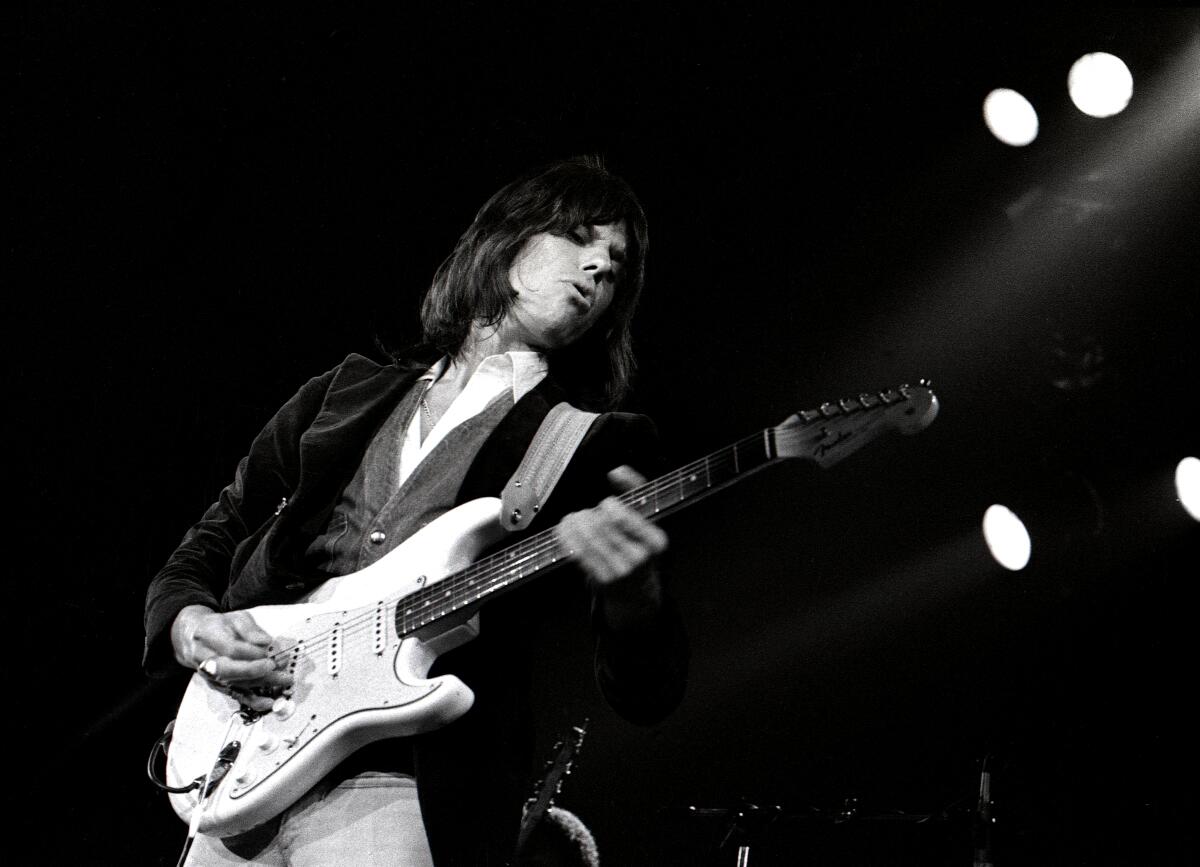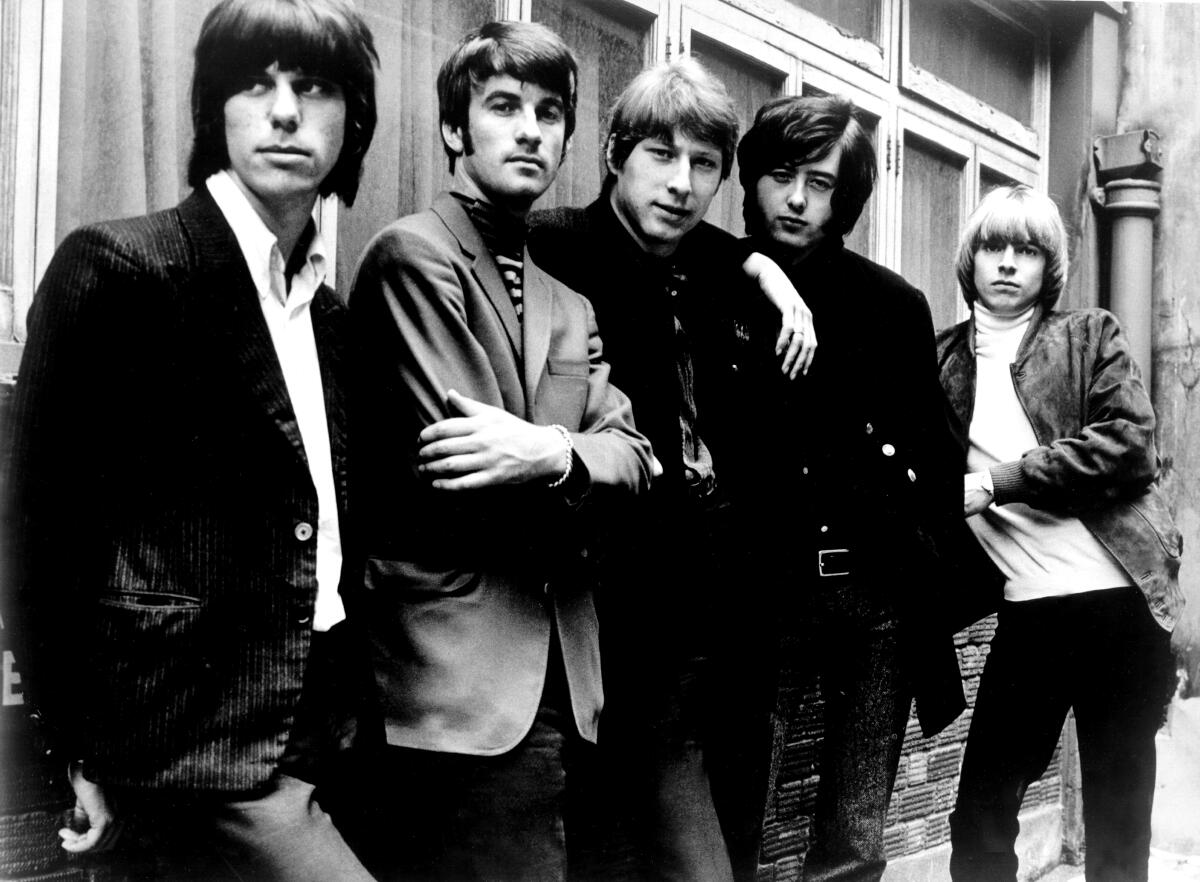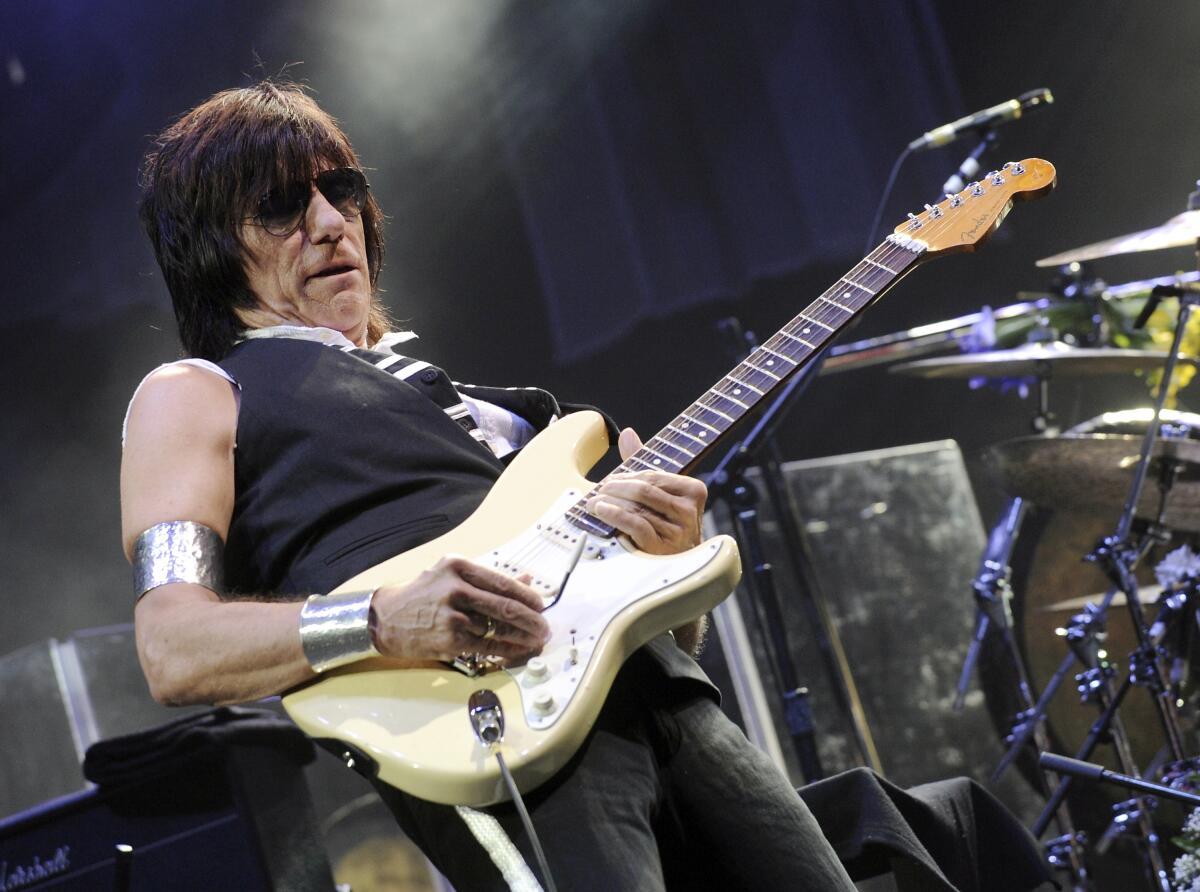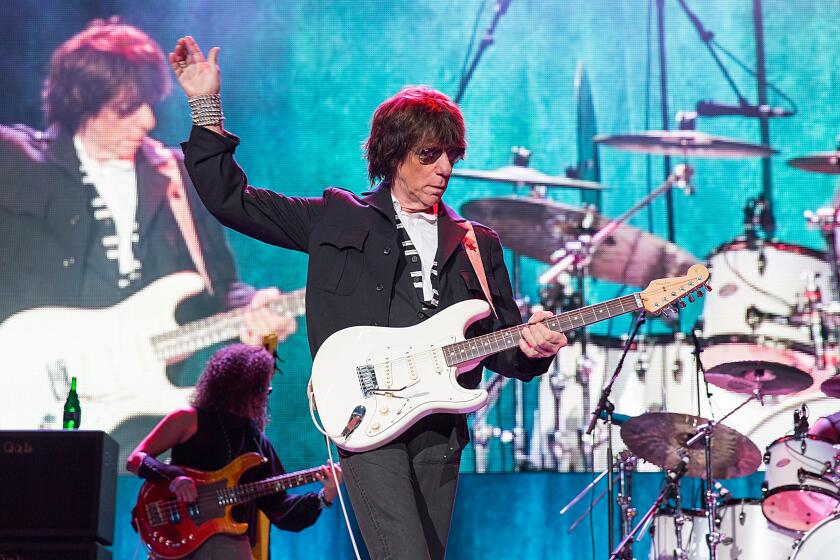Appreciation: Back when the electric guitar promised revolution, Jeff Beck fearlessly explored and mastered it

- Share via
In an era littered with great guitar players, Jeff Beck was a legitimate contender for the best of his generation.
Like Jimi Hendrix, he played with imagination and invention, harnessing the power of feedback and effects in a way that shaped the sound of modern rock. Like his childhood friend Jimmy Page, he was grounded in blues but not beholden to it, an aesthetic choice that separated him from Eric Clapton, the guitarist he replaced in the trail-blazing British Invasion group the Yardbirds. Clapton split for purist reasons: He bristled at the notion the Yardbirds should play pop. Beck didn’t view this evolution as a betrayal of principle, but as an opportunity for adventure, a way to test the limits of his instrument.
Jeff Beck was among the rock-guitarist pantheon from the late 1960s that included Eric Clapton, Jimmy Page and Jimi Hendrix. Beck won eight Grammy Awards and was inducted into the Rock and Roll Hall of Fame twice.
Throughout his career, Beck, who died Tuesday from bacterial meningitis at age 78, kept searching for the outer limits of the guitar. During his time with the Yardbirds, he discovered sounds lurking within that still possess the ability to startle. Listen to how the band’s version of Bo Diddley’s “I’m a Man” escalates into a cascade of white noise during its concluding rave-up or how Beck’s elongated phrasing on his solo for “Shapes of Things” mimics the mind-expanding textures of backward tapes or how “Over Under Sideways Down” careens forward upon a wailing, bent, high-pitched riff. This is where the blues collided with modernism.

Beck’s artistic process often involved a fair amount of retraction as well as exploration. Take his final album “18” and its accompanying tour, a collaboration with Johnny Depp launched during the height of the COVID-19 pandemic. Filled with covers of oldies and carrying a sludgy patina, “18” suggests that Beck spent his final years embracing retrograde notions, which is misleading. He certainly harbored a nostalgic streak, taking great pains to launch period-accurate tributes to his early heroes Cliff Gallup — the guitarist for rockabilly icon Gene Vincent, who was saluted on 1993’s “Crazy Legs” — and Les Paul (2011’s “Rock & Roll Party: Honoring Les Paul”), but he also cultivated creative partnerships with female musicians such as guitarist Jennifer Batten, bassist Tal Wilkenfeld and vocalist Imelda May, a trait that set him apart from his British rock peers.
Then again, Beck always seemed separate from the rock’s ruling class, chasing a muse that brought him to places that were slightly outside of the mainstream. Once he left the Yardbirds, he teamed with Rod Stewart and Ronnie Wood in the Jeff Beck Group, minting the crunching, cinematic blues-rock that Page would perfect on the first Led Zeppelin album. Beck lacked the commercial instincts of his old friend, a trait that painfully paired with his nasty habit of alienating his lead singers. Stewart and Wood left the guitarist after two albums, finding the camaraderie they craved in the ragged, rowdy Faces. Beck never indulged in such revelry, at least in his music. He sought serious players with a penchant for improvisation, a quest that could point him toward such heavy, almost leaden collaborators as bassist Tim Bogert and drummer Carmine Appice of Vanilla Fudge, players who pushed him in the direction toward anonymous hard rock. Ultimately, his hunt for the right support led him to the slick jazz fusion of “Blow by Blow,” the 1975 album that finally established him as a star in his own right.

Before “Blow by Blow,” Jeff Beck did manage a fluke hit in the U.K., when “Hi Ho Silver Lining,” a fizzy trifle pitched halfway between mod and music hall, managed to make its way to No. 14 in 1967. Despite its success, Beck didn’t care for either the song or his own lead vocal, his disdain propelling him to find places where he could concentrate on playing guitar. He found that with “Blow by Blow,” a record where he turned the exploratory fusion of John McLaughlin’s Mahavishnu Orchestra into something digestible to a broad audience — something smooth, melodic and funky. Beck consolidated his achievement with its swift sequel “Wired” where he was given a considerable lift by the contributions of drummer Narada Michael Walden and keyboardist Jan Hammer. It was the rare time that Beck managed to capitalize on positive momentum but it didn’t last long: He soon took an extended break, the first of many during the 1980s and 1990s.
Beck later explained, “The basic lack of drive is because of lack of material, really.” Songwriting didn’t come easily to him, a problem compounded by his tetchiness with lead singers, leaving him on a constant hunt for new material or writing partners. During the periods he didn’t have those collaborators on hand, he retreated to his home garage, tinkering on old automobiles and hot rods. Beck alluded to this hobby with “Jeff Beck’s Guitar Shop,” the instrumental 1989 album on which the guitarist discovered how to toughen up his fusion, creating the blueprint for the last act of his career. It wasn’t just the introduction of a heavier backbeat and canny appropriation of modern electronic production that made the difference: By the end of the 1980s, Beck played guitar in a different style, eschewing effects and abandoning a guitar pick for an intricate fingerstyle that also incorporated him twiddling with volume and tone knobs.

“Jeff Beck’s Guitar Shop” won the guitarist his second Grammy for rock instrumental performance, a category he’d dominate in the 2000s. Maybe the melodies on “Who Else!” (1999), “You Had It Coming” (2001) and “Jeff” (2003) didn’t quite stick but his playing remained a marvel of elegance and restraint. He managed to freshen this formula on both “Emotion & Commotion,” a proggy 2010 set where he was sometimes paired with an orchestra, and the leaner “Loud Hailer,” a 2016 affair that reconnected to the restlessness of the Jeff Beck Group.
These latter-day albums showcased a mature musician who had perfected an instrumental technique yet still strove to find new wrinkles, and who figured out how to surround himself with sympathetic spirits who could keep pace with his gallop. These records are often stronger than the albums he released in the 1970s and 1980s, where he alternated between moments of inspiration and grudging attempts at following fashion, such as “Flash,” a weird 1985 LP where producer Nile Rodgers pushed Beck to play synthesized funk and Arthur Baker sneaked a few claustrophobic collages into the mix. “Flash” doesn’t conventionally succeed but Beck’s playing on the record is invigorating, cutting through the computerized murk and revealing the secret to his art: He benefited from creative tension.
Beck remained a compelling player when he was comfortable — he was too particular and precise to not command attention — but he shone when battling his bandmates or serving as a hired gun. He mined the beauty laying within Stevie Wonder’s “Lookin’ for Another Pure Love,” turned Donovan’s neo-nursery rhyme “Barabajagal” into lean, gnarled rock ‘n’ roll, helped keep Mick Jagger’s 1985 solo debut “She’s the Boss” from getting swallowed by MTV gloss and served as a humanizing counterpoint on Roger Waters’s dour 1992 concept album “Amused to Death.”
In each case, Beck’s playing startled in its force and originality: He would sting at moments that would seem to require finesse and relax into long, lyrical solos at periods of high tension. As much as his technical skill, this imagination was Beck’s calling card; it was easy to stick with him through the fallow periods because he always possessed the ability to surprise.
It’s unfortunate that his final project wound up as the torpid Depp collaboration “18,” but even that record felt true to Beck’s artistry. He would follow his inspiration even if it amounted to a dead end, all in the hopes of discovering a moment of transcendence.
He found it more often than not.
More to Read
The biggest entertainment stories
Get our big stories about Hollywood, film, television, music, arts, culture and more right in your inbox as soon as they publish.
You may occasionally receive promotional content from the Los Angeles Times.











